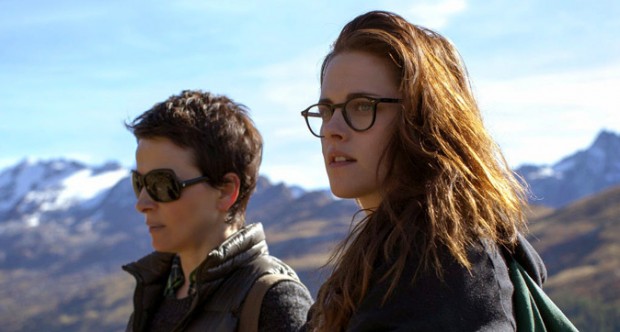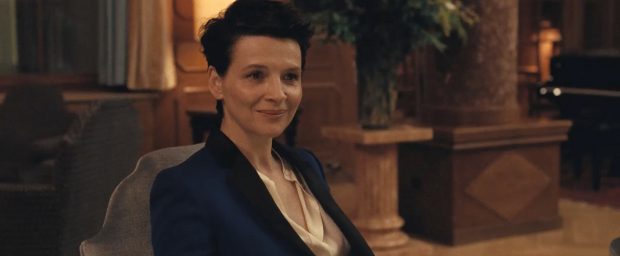
One of the last films to premiere at the Cannes Film Festival was French director Olivier Assayas’ latest work, Clouds of Sils Maria. Re-teaming with Juliette Binoche and bringing aboard a couple of Hollywood actresses, Kristen Stewart (as Binoche’s assistant Valentine) and Chloe Grace Moretz (as young actress Jo-Ann Ellis), the story is told through Maria’s perspective, reflecting on shifting values and art and how to still keep them close while moving forward at the same time.
In our positive review, we said, “Sils Maria is clearly the product of two authors grappling with their past. Assayas and Binoche could simply remake the past; instead, they are reconsidering it and reinterpreting it in a new light. They have inhaled the youthful energy around them to move toward a thrilling future.” Ahead of the premiere, Assayas, along with producer Charles Gillibet and actors Juliette Binoche, Chloe Grace Martez and Lars Eidinger, gathered to discuss evolvement, importance of being as an actor, working with famous actors, and more. See the highlights below, along with the full press conference.
Living in the Present
The main focus of the film, and the press conference, is Juliette Binoche. When asked about her long-running involvement with the festival and if it’s a happy memory for her, she says, “It is indeed.” The actress expands, “This is a place where we all meet, thanks to the journalists, as well as there is great acknowledgement of the job we do. I live very much in the present, I don’t live in the past. I fervently believe in the present and I think that the cinema makes me call myself into question all the time. Before the camera I never know how I’m really going to play out my character. For me, I really very much live in the present. I love to call this verticality in fact. You have to have your feet well anchored on the ground and you have to dream at the same time. Things changes, however, things evolve. We keep meeting new films and new people. That is why cinema is so magical.”
Moving forward is a vital thing for Binoche, saying, “To try and find the new, for me, is very important. What is the new to me? Because it’s creative always and not knowing. Because repetition is boring to me. I haven’t seen the film totally done yet, so better interviews tomorrow. [Laughs] I think there is always a need of trying to go to the new. That is totally true to me. That’s why after Blue, for example, I read so many scripts about dead family, a woman surviving without the child. Enough of that, I’ve done it. And I can go back to it maybe a few years after, but I am not thinking of future. I think the future is coming to you more than you are coming towards the future. It’s just being in the right place inside of you and trusting that something will come. Because if you think too much in advance then it’s boring and also life is not like that. It’s not happening like that to me.”
Learning From Binoche and What France Does Better Than America
“Obviously, my first attraction to the project was Olivier,” highlights Moretz. “Because I’d seen Carlos a couple years before and I totally fell in love with it. I thought that was such a magnificent film. And, obviously, to work with Olivier in not only any project, but specifically a very French project with Juliette would be so special. Because I think there is some things much more innovative about French cinema than American cinema. Because it’s new, it’s alive and there is something that is very raw about it that we can’t quite capture in America yet, in another forms of film too. So that was my first real attraction to the project and I read the script and fell in love with the script and I fell in love with Jo Ann, and then I fell in love being able to work with Juliette and Kristen, of course, and everyone on this project.”
Moretz was also asked if she is similar to her character, and she adds, “I definitely I don’t treat my peers as ruthlessly as Jo Ann does. I was just actually telling Juliette, because I saw the movie just yesterday, and I absolutely fell in love with her character and she is so magnetic on screen. And I think that you look back at Chocolat and The English Patient, and she has always been so magnetic. And I think that there is so much to learn working with women in this business, especially women like Juliette. And I think I was, if anything, I was incredibly lucky to be working on this project.”

On Not Rehearsing and Gaining Trust
After highlighting how ruthless the Hollywood business is for women over forty, Binoche comments on how she keeps her appearance as a natural and authentic woman. “Of course, the screenplay lends itself to the fact that one is practically bare in terms of who one is, one’s identity,” says Binoche. “That means that you have to have tremendous confidence, both in yourself and in the director. We hardly rehearsed with Olivier. We threw ourselves into the scenes and there was hardly any rehearsing. We had no safety net and that’s why it was such a wonderful experience. As we did various takes we realized that we had to just to go into this all together and just adjust things as we acted. It is a special way of shooting, obviously. I am very happy to place myself in the service of the storyline where I’m privileged to be an actress. And I have to be accountable in a way for what I do. I have to spare no time and effort and do as best as I can.”
“I fully agree with what Juliette said,” Assayas adds. “It only works if you have actors who are truly generous of themselves. Between a director and an actor it’s really a question of confidence and of trust. That trust in fact marks out the path we’ll follow together. If there is full trust we can reach the end of the journey. We found this way of working together. We don’t rehearse. This is what started to do a little bit in L’eau froide [Cold Water] and, in particular, in Carlos. I think it is a way of involving the actors much more in the actual creation of the film. Because I don’t want to know beforehand what they’re going to do. I want them to follow their first intuition. That’s what I want to have filmed.”

On Playing an Actress as an Actress
“I don’t think there is any advantage,” Binoche says of playing an actress as an actress. “But I know what it is. But at the same time you have to create a character, you know, for the film. That was funny, very funny. We had a lot of fun because we were laughing about what we know. Even though it takes place in the theatre. What is the advantage? I don’t see any of them. But I know what it is all about in a way, so I didn’t have to do any research and spend three months somewhere. [Laughs] But at the same time, the choice for me what was funny is to make a moody actress, not sympathetic. She is really angry with the world. [Laughs] The world is not nice to her and she has to overcome her emotions. That was fun to me to play.”
Commenting on if she found herself in the character, she adds, “We are never really the character and we are totally the character. Because when we are in it we have to have ourselves believing we’re the character. So there’s a transformation we have to go into. You’ve got to produce something in your body that is allowing this to happen. That’s the magic of acting, that it’s something of the incarnation that’s very special because you have to relate your body to what is written, but also what you are feeling. And those layers you’re putting together is such an excitement for an actor and that’s very an advantage and the disadvantage is that it’s a lot of work.”

On Binoche Being the Best Partner an Actor Could Have
As for Lars Eidinger, who is playing a director, when asked if he used the role to take advantage of bad directors, he simply says, “I am a director by myself.” When it comes to the experience, he adds, “For me, the whole thing was kind of surreal. I know everything out of other perspective. I am self-confident actor. I’m working for 18 years. But on the other hand, actresses like Juliette Binoche, I know them from TV, from movies, just with a frame around them. And suddenly I am sitting next to her and playing with her. Like the movie Roger Rabbit, there’s this toon world and there’s the real people. Sometimes I felt like I’m into the toon world, which is really weird.”
“I saw myself coming into a room where Juliette Binoche is sitting and it’s crazy for me, really,” he adds. “But on the other hand, it was for me to get know her. It was the best experience I ever had with an actress in my life because she’s the best partner you can have as an actor. Because usually I’m used to actresses, famous actresses, and they are very concentrated on themselves and she’s very concentrated on a partner, which is really exciting. It was the most satisfying experience for me with an actress.”

Actors as Avatars and Fassbinder Inspiration
After revealing that the play inside the film is based on Rainer Werner Fassbinder’s The Bitter Tears of Petra von Kant, Assayas opened up about actresses embodying different personas. “In fact, that’s one of the assets, one of the stimulating things when you portray an actress, because an actress has her own life after all. Then she lives in the place where she stars in the films and that person lives via the media too. An actress is three different people, if you like. And you have to cope with these three different identities and go from one to the other. I really like this idea of someone who is actually quite isolated to focus on her work, yet the rest of the world forced her to remain in contact with that modern world. She’s like an avatar. Each of the characters is like a kind of an avatar in fact in the film. So that’s an interesting dimension. I really didn’t try to depict the contemporary world but it is one aspect of the modern world, which I find absolutely riveting, and it fit in with the characters and the storyline.”
Clouds of Sils Maria premiered at Cannes Film Festival and will be released be IFC Films.


